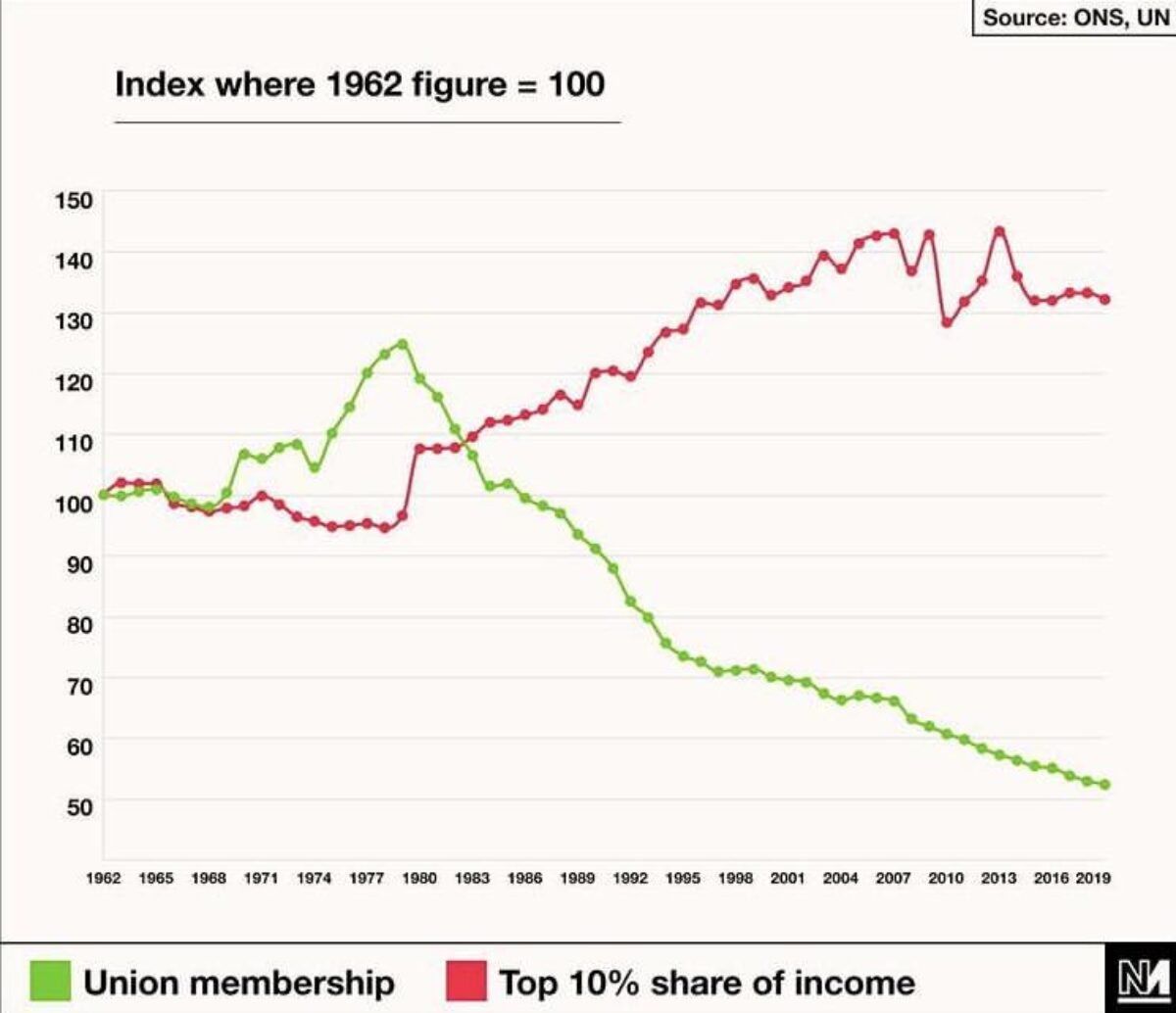The recent wave of industrial unrest in the UK, that seems set to continue, has brought the trade union movement back into the spotlight. The appearances of Mick Lynch and co across the media have been monumentally refreshing changes from the tiresome political analysis we are used to, and have thoroughly debunked outdated Conservative attack-lines, that seek to frame unions as militant and greedy. Reigate Labour resoundingly rejects that narrative and instead argues that the unions should be perceived as a crucial pillar of our society; but why?
Unions take on two distinct roles that justify our position at Reigate Labour: (1) protecting workers, and (2) maintaining representative democracy by ensuring ordinary workers are elected to our law-making institutions. Therefore the vast majority of the population benefit from a strong trade union movement, directly and indirectly, without which we would be left to the unscrupulous mercy of bad bosses, and even worse Tory politicians.
In the first role of protecting workers, unions have secured for rights for us that are now taken for granted; yet would not exist without the movement’s fight. The list is endless: 8 hour days, weekends, basic heath & safety, pensions, sick pay, maternity leave, equality, the abolition of child labour. However, while these may seem established victories of a bygone era; it is a fact that the unions still fight for the establishment of these rights in numerous sectors today, particularly in the gig-economy and exploitative multinational companies.
Furthermore, these rights are never safe from erosion. Let us recall for instance, the infringements of Mike Ashley upon Sports direct staff, or the recent P&O ‘fire and rehire’ debacle. However, worker’s pay has always been the biggest target. Statistics from the Office for National Statistics (ONS) show that since the early 1980’s, the wealth of societies top 10% has continued to increase dramatically while the bottom 90%’s has fallen (see figure 1) . In essence, an extraction of wealth straight from worker’s pay packets to the bosses pockets.
However, the correlation between this concentration of wealth and the falling membership of trade unions in the 1980’s, spurred on by restrictive government legislation, is clear to see. Decreasing union strength leads to increasing inequality. By engaging in industrial action, the RMT and others seek to reverse this trend. The unions are fighting for what has been extracted from their members over the past decades, which in the context of raging profit-driven inflation, becomes all the more necessary.
In their second role, unions ensure that governing institutions are no longer monopolised by the few. Unlike the Tories, Labour have no billionaire oligarch donors, so to somewhat close the financial mismatch, the unions divert a proportion of their revenues to ‘political funds’ that are funnelled into the party. Such funding is crucial to supporting ordinary working-class candidates to campaign for office, without which, such candidates would be crushed by the weight of the Conservative financial machine.
The importance of working class representation is immeasurable. These candidates fight for the rights to fair pay, housing, food and affordable energy for the vast majority of society, while many Tory representatives, with financial interests adverse to greater government intervention, actively seek to oppose them; a prime example being the 2016 vote against making homes ‘fit for human habitation’!
The conservatives have consistently sought to legislate against union funding for Labour, for example via the ‘opt-in’ clause, requiring members to take action to ensure a proportion of their union dues are contributed to political fund. A hypocrisy considering the sources of Conservative funding, but also a call to action for many workers who demand respect for the unions’ role in ensuring an equally representative democracy.
The RMT, CWU, TSSA and others are currently reminding us that unions are the only organisations capable of fulfilling these crucial roles. In the context of raging inflation and government inaction, this becomes all the more pressing. It is definitive that we understand this to reassert a revived narrative. Unions fight for fair rights, and for fair representative government. Therefore we need unions, and must support the movement in it’s current struggle.


